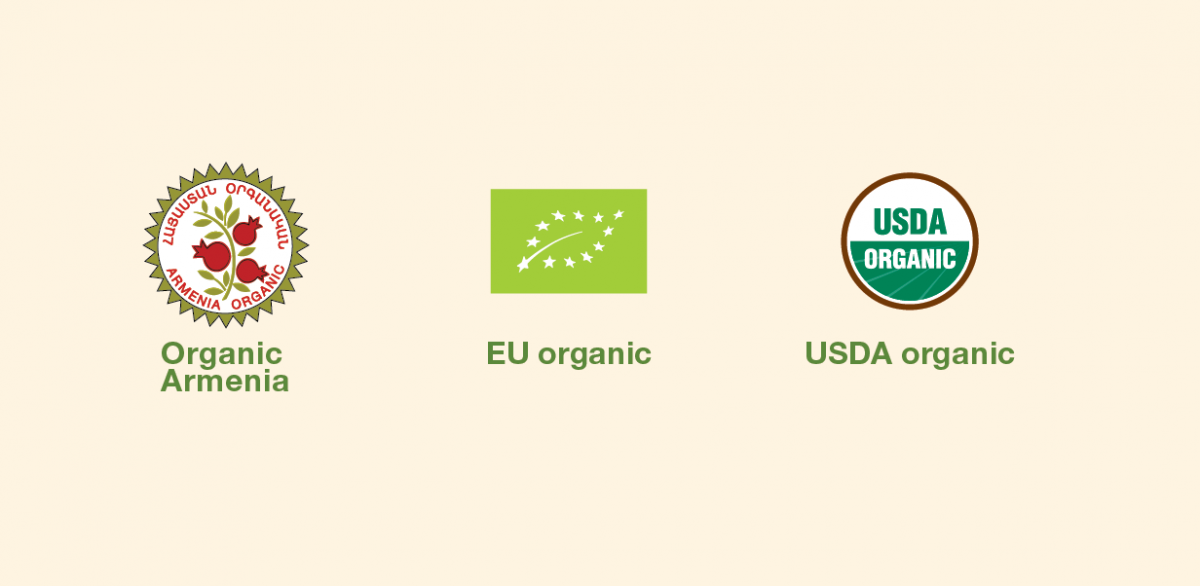What it means to be organic?
Organic agriculture is a production system that sustains the health of soils, ecosystems and people; relies on ecological processes, biodiversity and cycles adapted to local conditions, combining tradition, innovation and science to benefit the shared environment and promote fair relationships and a good quality of life in longer perspective. Farming and production is organic wherever no toxic pesticides, synthetic fertilizers, or GMOs are used, and no antibiotics or growth hormones are given to livestock. Organic Producers, including processors, undergo regular certification procedures by third-party inspectors to ensure products they offer at the market are organic and trustworthy for human consumption.
In September 2005 in Adelaide, Australia, the General Assembly of IFOAM - Organics International passed a motion to establish a succinct Definition of Organic Agriculture. After almost three years of work by a designated task force, a definition reflecting the four Principles of Organic Agriculture in a succint way was adopted in Vignola, Italy as follows:
Organic Agriculture is a production system that sustains the health of soils, ecosystems and people. It relies on ecological processes, biodiversity and cycles adapted to local conditions, rather than the use of inputs with adverse effects. Organic Agriculture combines tradition, innovation and science to benefit the shared environment and promote fair relationships and a good quality of life for all involved.
Are chemicals and/or synthetic fertilizers used in organic farming?
No. In order to be certified as organic food products must be grown without using persistent pesticides. Organic farmers are prohibited from using most synthetic fertilizers. The soil remains healthy and fit for organic agriculture wherever manure, compost and other organic materials are used as fertilizers. A major part of synthetic fertilizers used in conventional farming ends up in ground and surface waters, polluting natural ecosystems.
Does organic agriculture rely on GMO?
No. Organic means GMO-free. GMOs are prohibited from production and processing of foods, which are organic.
Does organic agriculture use sewage sludge?
Conventional farmers oftentimes use sewage sludge as fertilizer. Sewage sludge includes anything that is flushed, poured or dumped into the waste water system. Yet, in organic farming using sewage sludge is prohibited.
Does organic agriculture rely apply antibiotics?
The overuse of antibiotics to foster growth in conventional livestock production has contributed to development of antibiotic-resistant strains of some dangerous microbes. Organic farmers can only treat livestock with antibiotics as a last resort for sick animals and the animals that receive antibiotic treatment lose their organic certification. This helps preserve the effectiveness of vital antibiotics for humans.
What about using hormones in livestock breeding?
Conventional farming regularly relies on growth hormones given to cows to boost milk output. However, these hormones are capable of impairing animal fertility and eventually lead to hoof disorders and abnormal milk, which has been linked to higher risks of cancer in humans.
Do organic farming and production help reduce human impact on climate?
Organic agriculture is a means to treat our soil with more care. Healthy soil naturally retains photosynthesized carbon dioxide instead of releasing it back into the atmosphere, which means reducing the impact humankind has on climate changes.
How animals are treated in organic farming?
Organic farmers are required to accommodate the natural behavior of animals and meet health and wellness requirements, such as year-round access to the outdoors, space for exercise, clean and dry bedding, clean water, shelter, and direct sunlight for their livestock.
How nutrient are organic products?
Studies show organic fruits, vegetables and grains contain more antioxidants, fewer nitrates and cadmium and fewer pesticide residues than non-organic crops, which makes them more nutritious.
Is organic food more expensive than conventional food?
There is a widely spread misconception that organic food is more expensive. In fact, the cost of producing food organically is considerably lower than the cost of conventional production. Consumers in many developed countries with higher demand for organic products do pay more also due to more rigorous production standards, and the costs of certification, among other reasons. Yet, in developing countries uncertified organic food is generally cheaper to produce and sold at the same price as conventional food. This is because organic agriculture increases the productivity of the total farm agro-ecosystem and reduces the amount of purchased external inputs needed.
Across the globe, money invested in organic agriculture is money well invested. There is a growing understanding that organic agriculture reduces farm costs in the long-term by increasing soil fertility, ensures animal welfare, protects farmers against dangerous pesticide exposure and contributes to rural development by generating additional farm employment and fair incomes.
Can organic produce feed everybody?
Food security, which is the main concern here, relates to the question of providing equal access to food for as many people as possible rather than nourishing. Current food production far exceeds what is needed by the population globally, yet the problem of its fair distribution perseveres. Hunger is a matter of social, economic and political factors rather than limitations on productive capacity.
Organic agriculture can help increase food security by:
• decreasing dependence on external inputs and food distribution systems over which they have little control;
• reducing the likelihood of a production drop or yield failure through crop diversification;
• outperforming conventional agricultural systems under conditions of environmental stress.
Global yields in organic agriculture are at most 20% lower than in conventional agriculture in specific cases. In fact, many multiple cropping systems, such as those developed by smallholders and subsistence farmers, show higher yields in terms of total harvest per unit area. These yield advantages have been attributed to more efficient use of nutrients, water and light and a combination of other factors such as the introduction of new regenerative elements into the farm (e.g. legumes) and fewer losses resulting from pests and diseases.
Furthermore, organic agriculture has a unique ability to reverse processes of soil degradation and desertification and help safeguard the world’s production potential.
Why organic agriculture does not spread fast?
Organic agriculture requires a unique combination of knowledge, experience and intuition. Farmers need a holistic understanding especially of the soil ecosystem in order to be successful, and building this knowledge base is more time-consuming than purchasing synthetic pesticides and fertilizers. Given appropriate allocation of resources for organic research and extension, organic agriculture would become more attractive to producers globally, including Armenia.


